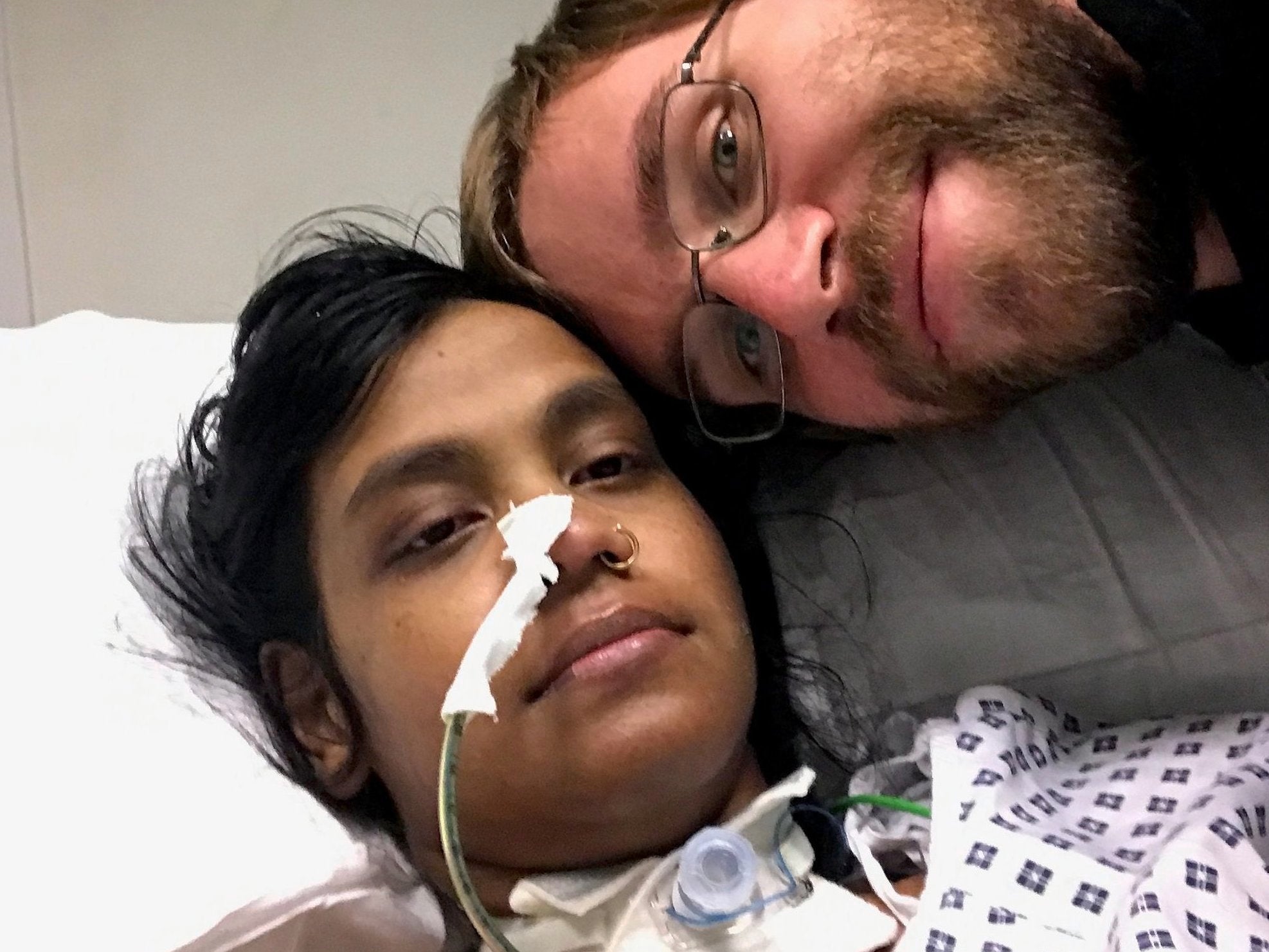Home Office under pressure to grant visa to sick woman threatened with removal while in a coma
MPs and campaigners call on ministers to reverse their decision and grant Bhavani Esapathi right to remain, while a petition under the hashtag #letbhavanilive garners more than 123,000 signatures
The Home Office has come under mounting pressure to grant a visa to a seriously ill woman who was threatened with removal from the UK while she was in a coma following major surgery.
The Independent revealed last week that Bhavani Esapathi, 31, received a letter stating that her application for leave to remain had been refused and that she was liable to be forcibly removed while she was in a vegetative state last September.
Politicians and campaigners have since called for the Home Office to reverse the decision and grant the Indian national, who is still seriously ill, right to remain.
A petition under the hashtag #letbhavanilive has meanwhile garnered more than 123,000 signatures from members of the public.
On receiving the refusal notice, Ms Esapathi’s fiance, Martin Mangler, 33, appealed against the decision while she was still unconscious, providing medical letters from her doctors stating that her life would be at risk if she were to travel.
But the Home Office said that while the medical treatment she was receiving was “unlikely” to be available to the same standard in India, this did not entitle her to remain in the UK – and that she could receive “palliative care” in her home country if the appropriate treatment wasn’t available there.
Lawyers and politicians said the case demonstrated how UK immigration rules were permitting the government to “send people to their death abroad” as part of the hostile environment.
Ms Esapathi’s local MP, Vicky Foxcroft, raised the case in the House of Commons on Thursday, saying: “Bhavani has Crohn’s disease and needs critical care that is unavailable in India.
“She has lived and worked in the UK for almost 10 years. While Bhavani was in a coma after major surgery, she received a notice from the Home Office telling her that she should leave the country.
“May we have an urgent debate on the government’s barbaric treatment of people?”
Leader of the House Andrea Leadsom responded by telling her to raise the case directly with the Home Office, saying: “The Honourable Lady raises a serious and worrying constituency case. I am sure that, were she to raise it directly with Home Office ministers, they would respond.”
When contacted by The Independent on Saturday, a Home Office spokesperson said the department had been "made aware of fresh evidence" in Ms Esapathi's case in March 2019 and that it was "currently being reviewed".
Ms Esapathi, who came to the UK on a study visa in 2010 and proceeded to work in the arts industry before she fell ill with Crohn’s disease, said she would be “risking her life” if she had to leave the country.

The Indian national had to be admitted to hospital again last month due to complications with her bowel. She currently relies on a drip and has to have a bag attached to her stomach, and is waiting to undergo further surgery in the summer.
Speaking to The Independent, Ms Esapathi said: “I’m in a pretty vulnerable state right now with somewhat of an open stomach.
“All of this is making my condition worse. You’re meant to avoid stress, but I can’t help my body’s reaction to certain things. I’m currently in hospital and haven’t been able to put on weight – stress is a big part of it.
“It would be a risk to my life if I had to leave. I won’t have any of the drugs that literally allow me to move. I don’t think it’s too much to ask to not want to die.”
The Home Office refusal letter to Ms Esapathi’s appeal, issued on 3 December, stated: “Whereas it is accepted that the healthcare systems in the UK and in India are unlikely to be equivalent, this does not entitle you to remain here ... Should it be the case that your illness deteriorates or you are unable to access treatment, you have not shown a lack of palliative care or family support available in India.”
It also claimed there were “no insurmountable obstacles” to her continuing relationship with German national Mr Mangler, who is settled in the UK, overseas, despite the couple stating in their application that his job as a volcanologist “depended on him staying in the UK”.
A letter from a number of surgeons at St Mark’s Hospital, where Ms Esapathi was operated on, states that her ”surgical and medical management is highly complex” and that it is “of vital importance” that her care continued to be coordinated and performed there.
“This also means that, both now and after her surgery in 2019, Bhavani will not be able to travel due to her ongoing need for specialist care in our hospital as her recovery after her next operation is likely to be protracted and complex,” it adds.
Join our commenting forum
Join thought-provoking conversations, follow other Independent readers and see their replies
Comments
Bookmark popover
Removed from bookmarks